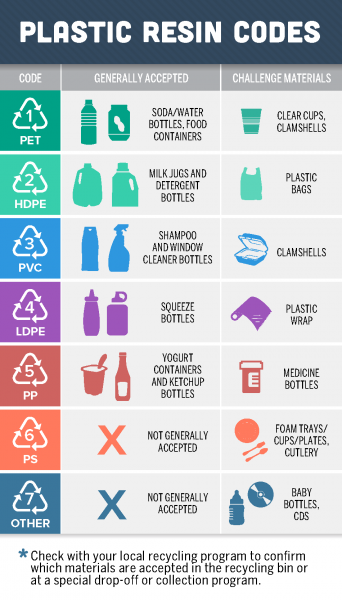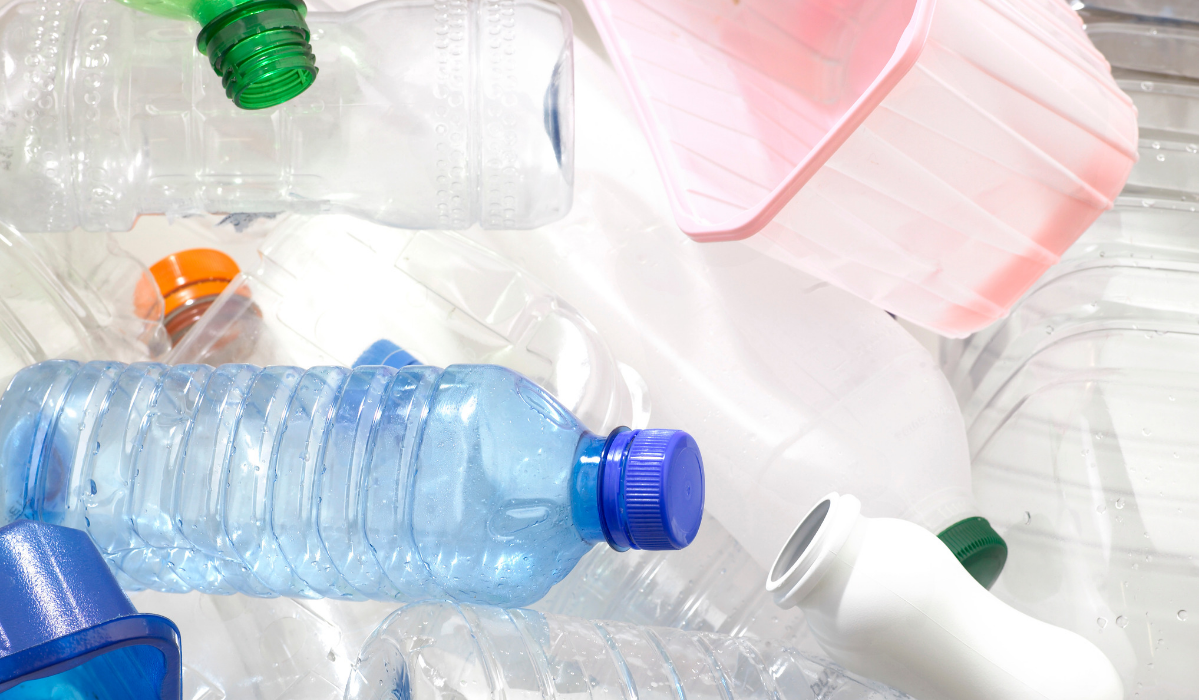Crunching the Numbers: Which Plastics Are Actually Recyclable?
Just because you see the iconic chasing arrows symbol on a bottle with a number inside of it does not mean the material you’re looking at is actually recyclable. Those little numbers, ranging from 1-7, are actually called resin codes. They are used to identify the type of plastic used for the product and just how recyclable or reusable the material is. In this post, we’ll explore some characteristics of each resin code/plastic and identify the key qualities, major uses and recyclability for each.
1 – Polyethylene Terephthalate (PET or PETE)
PET is likely the most popular plastic for use in consumer products. Most plastic beverage bottles are made from PET. It is known for having high clarity (able to see through it without cloudiness) and resistant to environmental stress cracks caused by cold or heat.
- Recyclable: Yes.
- Common Uses: Plastic bottles, peanut butter jars, salad dressing bottles, cold cups, grab and go containers, and take-out containers.
2 – High-Density Polyethylene (HDPE)
HDPE is a stiffer plastic with a multitude of uses. On the consumer side it is used to make milk jugs and motor oil bottles, but can also be used to make more sturdy objects like picnic tables and waste bins. HDPE is the most commonly recycled plastic and products made from it are both reusable and recyclable. It is a relatively simple and cost-effective process to recycle HDPE for secondary use.
- Recyclable: Yes.
- Common Uses: Milk Jugs, detergent containers, motor oil bottles, butter tubs, some shopping bags, picnic tables, plastic lumber, park benches, bed liners for trucks, other products requiring durability and weather resistance.
3 – Polyvinyl Chloride (PVC)
Likely the first thing coming to mind is that unmistakable white PVC piping used for plumbing and you would be right. But this soft, flexible plastic is also used to make food wrapping, blister packaging for consumer products as well as children’s and pet’s toys. It is used for many purposes due to being relatively impervious to sunlight and weather. While some PVC products can be repurposed, they are not recyclable.
- Recyclable: No.
- Common Uses: Clear plastic food wrap, teething rings, piping, children’s and pet’s toys, garden hoses, blister packaging, window frames, wire jacketing.
4 – Low-Density Polyethylene (LDPE)
When you think LDPE; think bags. Many of this plastics uses are bags for garments, bread or common grocery bags. This is also a very common plastic for can liners. LDPE is considered substantially less toxic than other plastics, yet it is not commonly recycled. This is changing for the better as many communities today are setting up recycling programs to handle this material.
- Recyclable: Depending on where you live. Check with your local collection service to see if they are accepting LDPE items.
- Common Uses: Shrink wraps, dry cleaner garment bags, squeezable bottles, bread packaging bags, grocery bags, produce bags, sandwich bags, can liners, landscaping boards and floor tiles.
5 – Polypropylene (PP)
PP is a tough, lightweight plastic with excellent heat-resistance qualities. It is microwaveable and freezable in many forms and serves as a barrier against moisture, grease and chemicals. These qualities make it an attractive use for things like cereal bags, keeping out moisture and sealing in freshness. PP is also used for cold cups, take-out containers, disposable dishware, and many consumer product uses. It is recyclable and considered safe for reuse in most forms.
- Recyclable: Yes.
- Common Uses: Cereal bags, disposable diapers, pails, plastic bottle tops, yogurt containers, potato chip bags, straws, packing tape, rope, brooms, bins, trays, cold cups, take-out containers, disposable dishware, medicine bottles.
6 – Polystyrene (PS)
PS is an extremely versatile, inexpensive and easily formed plastic with a wide-variety of uses. It comes in several, very different forms ranging from soft foams to sturdy plastic used in CD cases. In its foam form it is used for cups, take out containers, egg cartons and even packing peanuts. In its harder plastic form it can be used to produce plastic cutlery, hot cup lids and many other products. Recycling is not widely available for this plastic which is why around 35% of US landfill material is made from PS. It is also structurally weak and ultra-lightweight allowing it to break up easily and be dispersed readily throughout the environment. Much of the plastic contamination on earth can be attributed to PS.
- Recyclable: No for the most part. Some communities are beginning programs to recycle PS in its foam form.
- Common Uses: Cups, lids, egg cartons, take-out containers, plates, bowls, cutlery, packaging foam, insulation and underlay sheeting.
7 – Other
This category was created as an all-encompassing group for polycarbonate (PC) and “other” plastics. A new generation of compostable plastics, made from bio-based polymers like corn starch, (labeled PLA) are also included in this category, which can cause confusion for consumers. For this reason recycling and reuse standards don’t apply across the board here.
- Recyclable: No – although some are compostable.
- Common Uses: Baby bottles, water cooler bottles, sippy cups, oven baking bags and car parts.
How Johnston Can Help
Johnston works with leading vendors to offer food service products created using several of the plastic types listed above. We strive to offer our customers recyclable products that still suit their usage needs. Our dedicated specialists can help you identify the products and processes that are most suitable to your unique situation and most effectively combat illness outbreak in your facilities.
Contact a Johnston expert today to set up a time to meet and discuss your wants and needs.
Visit our contact page today!
About Johnston
Johnston has always stood for reliability, commitment, quality, and service. Our heritage means years of accumulated industry knowledge, the ability to see the bigger picture, and the know-how to determine the best possible approach. Combining this mastery with the drive to deliver exceptional results, Johnston goes beyond sales, developing strategic, end-to-end tailored solutions for each customer since 1881.



